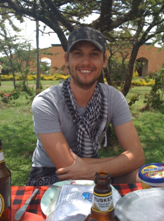Jon, 38 – Father-to-one, working professional & keen surfer who survived a life-threatening episode of pneumonia, PERTH
 Marketing and Communications Manager and keen surfer, Jon, 38, Perth, developed a “mysterious lung infection” in early January, 2014.
Marketing and Communications Manager and keen surfer, Jon, 38, Perth, developed a “mysterious lung infection” in early January, 2014.
The then otherwise healthy and active father-to-one, fell ill on New Year’s Day, while holidaying in the State’s south-west. He was experiencing stomach discomfort and generally felt unwell. Hoping the illness would quickly pass, Jon endeavoured to enjoy the few remaining days of his holiday.
However, upon returning to Perth on January 5, and experiencing “hot and cold flushes,” it was clear to Jon, that something was not right. So he visited a doctor, and was prescribed antibiotics and bed rest.
The following morning, Jon awoke and collapsed on the floor. Realising the seriousness of the situation, his wife, Heidi, took him to hospital, where his soaring temperature led to his immediate admission to the emergency department.
Jon spent the ensuing two weeks in hospital, as doctors worked hard to determine his illness. He was eventually diagnosed with atypical pneumonia, also known as “walking pneumonia” or “community acquired pneumonia” (CAP), which is often the result of a lung infection from a bacterial microorganism that commonly affects older children and adults aged under 40.
This is his story.
“I began to feel unwell around New Year’s Day. I was lethargic, cold, and in discomfort,” Jon said.
For the ensuing few days, Jon, who considers himself relatively fit and healthy, attempted to beat the illness from which he had succumbed.
Almost a week later, and after developing more serious, “flu like symptoms, including hot and cold flushes,” Jon visited a doctor, draped in a jumper, on a hot summer’s day. He returned home with a course of antibiotics, but continued to decline.
Overnight, his illness intensified. He awoke the following morning, “feeling cold, weak and unable to move.”
Observing his failing health, Jon’s wife, Heidi, took him to hospital.
“When we arrived at emergency, I was feeling extremely unwell.
“As soon as the doctor took my temperature, I was rushed in for treatment, because it had soared beyond 38 degrees celcius,” Jon said.
Blood samples were taken and Jon was relocated to a private room, to curtail the potential spread of his infection. He was then placed on a 24-hour antibiotic drip, and underwent a series X-rays to confirm his diagnosis.
Yet, despite the administration of antibiotics and constant medical supervision, Jon’s health continued to fail. With little appetite, he began to shed weight, his oxygen levels remained low, and he continued to be plagued by a “persistent, debilitating cough.”
After spending more than a week in hospital, Jon was diagnosed with atypical pneumonia and placed on appropriate antibiotics. Over the ensuing days, his health began to improve.
“I then spent another few days in hospital recovering before I was allowed to go home. Even when I left hospital, I was still on some strong medicine for quite a while,” Jon said.
“I lost around eight kilos of weight during my hospital stay, so felt very weak, tired and irritable by the time I arrived home.
“I found it tough to walk, and it took me months to regain my strength,” said Jon.
A week after returning home from hospital, Jon went back to work. However, just a day later, it was clear that he was not fit to recommence. Fortunately his “understanding employer” sent him home, where he worked for the next two weeks.
“I did miss some work being ill, but they were really understanding and accommodating,” Jon said.
“After recovering from atypical pneumonia, I initially found it draining to socialise. I was mentally drained, and because I had been so sick, I was cautious with my health for a long time post- recovery.
“It took a good few months before I started to feel 100 per cent again,” Jon said.
Prior to contracting pneumonia, Jon was unaware of the severity of the potentially life-threatening illness. He mistakenly considered it an infection of the elderly, and certainly not something that someone of his age, could contract.
“My doctor told me that if I had fallen sick with atypical pneumonia 20 years earlier, I probably would have died from the illness.
“It was just so debilitating,” Jon said.
Jon, who is now aware of the availability of a vaccine to help protect against the bacterial strain of pneumonia, pneumococcal pneumonia, said he would definitely be vaccinated when he qualifies for the free vaccine in the future, whether due to age, or other health-related risk factors.
“If my doctor said I was at increased risk of pneumococcal pneumonia due to my age (65 or above), or otherwise, I would definitely get vaccinated,” said Jon.
“Vaccination can literally mean the difference between life and death.”
